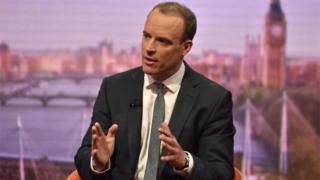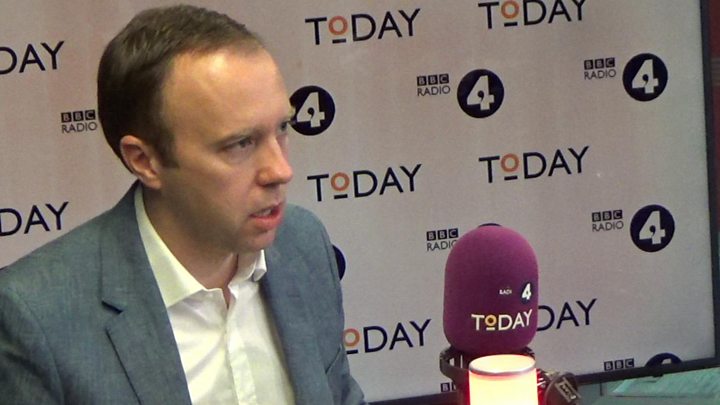Tory leadership: Dominic Raab and Andrea Leadsom enter race

Former cabinet members Dominic Raab and Andrea Leadsom are the latest Tory MPs to announce they will run for party leader.
They become the sixth and seventh candidates to enter the race after Theresa May said she would resign as party leader on 7 June.
Speaking to the Mail on Sunday, Mr Raab said the UK needed to leave the EU on October 31 “at the latest”.
Ms Leadsom said she also supported a no-deal Brexit “if necessary”.
The former Commons leader and Environment Secretary told the Sunday Times to “succeed in a negotiation, you have to be prepared to walk away.”
Mr Raab – Mrs May’s Brexit Secretary before he resigned in November 2018 – said he would “prefer” a deal but he said the country needed to “demonstrate unflinching resolve” to leave when negotiations end in October.
Environment secretary, Michael Gove is also set to announce he will contend for the leadership role, according to the Sunday Times.
His supporter – former farming minister, George Eustice – told the paper the next Conservative leader needed to “respect Brexit” and “have the wherewithal to deliver it”.
Party bosses expect a new leader to be chosen by the end of July.
Mrs May will continue as prime minister while the leadership contest takes place.
Five other candidates have so far confirmed their intention to stand:
- Foreign Secretary Jeremy Hunt
- International Development Secretary Rory Stewart
- Health Secretary Matt Hancock
- Former Foreign Secretary Boris Johnson
- Former Work and Pensions Secretary Esther McVey
All the leadership contenders have strived to make their position on Brexit clear to their electors – the 313 Tory MPs who choose a shortlist and the 124.000 party members who will have the final say.
Mr Hancock said Mrs May’s successor must be more “brutally honest” about the “trade-offs” required to get a deal through Parliament.
Mr Stewart said he would not serve under rival Boris Johnson because of his backing for a no-deal exit.
Mr Hunt told the Sunday Times he had the business experience to avoid a no-deal Brexit.
By contrast, Ms McVey told a listener to LBC radio the UK “had to come out”, and if it that meant a no-deal Brexit then “that’s what it’s got to be”.

Media playback is unsupported on your device
Mr Raab – also a Brexiteer – told the Mail on Sunday: “We can’t live in a country where politicians make promises to respect your vote in a referendum, and then junk them if they don’t like the verdict.
“The country now feels stuck in the mud, humiliated by Brussels and incapable of finding a way forward. The prime minister has announced her resignation. It’s time for a new direction.”
Mr Raab said “leadership with conviction” was needed to change the dynamic of Brexit.
He added: “I will fight for a fairer deal on Brexit, a fairer deal for British workers, and a fairer society where every child can fulfil their potential.”
At the time of his resignation as Brexit Secretary Mr Raab said he quit over “fatal flaws” in the draft Brexit agreement with the EU.
In his Mail in Sunday interview, he said there was still time to negotiate changes to the Northern Ireland backstop – the agreement to maintain an open border on the island of Ireland in the event that the UK leaves the EU without securing an all-encompassing deal.
He described it as the “Backstop of EU laws”, over which he said the UK had no say over.
He said: “That is a reasonable, limited, request and would work in all sides’ interests.
“It is the only solution MPs have approved. But, we will not be taken seriously in Brussels, unless we are clear that we will walk away on World Trade Organisation (WTO) terms, if the EU doesn’t budge”
Who are the Conservative members?
Most members of most parties in the UK are pretty middle-class. But Conservative Party members are the most middle-class of all: 86% fall into the ABC1 category.
Around a quarter of them are, or were, self-employed and nearly half of them work, or used to, in the private sector.
Nearly four out of 10 put their annual income at over £30,000, and one in 20 put it at over £100,000. As such, Tory members are considerably better-off than most voters.
Read more from Prof Tim Bale here
Tory MPs have until the week commencing 10 June to put their name forward, and any of them can stand – as long as they have the backing of two parliamentary colleagues.
The candidates will be whittled down until two remain, and in July all party members will vote to decide on the winner.
The last leader elected by the membership was David Cameron in 2005. Theresa May was unopposed in 2016.
It will be the first time Conservative members have directly elected a prime minister, as opposed to a leader of the opposition.




